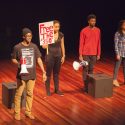UW-Madison to take part in national Ethnic Studies Week
Students and educators from the University of Wisconsin–Madison will join others from around the nation in celebrating Ethnic Studies Week from Oct. 4-8.
Organizers say the national Ethnic Studies Week was inspired by recent efforts to curtail multicultural education.
Initiated by 185 educators and endorsed by educational and activist organizations around the country, the week of educational activities celebrating America’s multiethnic and multicultural composition is designed to promote the relevancy and importance of ethnic studies and academic freedom nationwide.
“This week represents our determination to defend this right on a national level, even as we do so in diverse ways that reflect our local realities,” says Sandy Magaña, associate professor of social work and director of Chican@ Latin@ studies. “This week we join thousands of people across the United States in asserting our right to teach and learn the diverse stories that make up the U.S. experience.”
Magaña says ethnic studies began about 40 years ago as a part of the Black, Chicana/o, Puerto Rican, American Indian and Asian American liberation movements of the 1960s, when students and teachers petitioned and protested in demand of a curriculum that reflected their history and experience. She points out that the Department of Afro-American Studies at UW–Madison is celebrating its 40th anniversary this year.
UW-Madison requires all students to complete an ethnic studies requirement as part of its core general education. The requirement is intended to increase students’ understanding of cultures, social norms, economic circumstances and contributions of a variety of racial and ethnic groups in the U.S.
Ethnic studies are seen to be vital to the well-being of the U.S. and the world because they promote research and education on the histories, cultural contributions, economics and social circumstances of the world’s diverse populations.
By offering such exposure to ethnic studies in a higher education setting, students, faculty and staff are able to actively engage with people, cultures and ideas they might not otherwise encounter. Students also gain a fuller understanding of society as a whole and their own places within it, as well as the knowledge and critical thinking skills to become responsible global citizens.
In addition to coursework, UW–Madison students are encouraged to learn about the world outside the classroom through such activities as service learning, internships and study-abroad opportunities.
At UW–Madison, the week’s activities include a lecture by Dan Duster on “Anti-lynching and Civil Rights Activist Ida B. Wells.”
Duster is an activist, motivational speaker and business consultant. He’s also Wells’ great-grandson and will speak about the effect of her legacy on his life, her contemporary implications and his experiences as person of color at a predominantly white university.
Duster is scheduled to speak from 5:30-7:30 p.m. on Wednesday, Oct. 6, in 4141 Helen C. White Library.
Panel discussions throughout the week will explore the importance of ethnic studies programs and Chican@ students’ fight for ethnic studies; the music of Cuban singer Benny Moré; the current debate over immigration; and the history, context and contemporary meanings of the so-called “Coastie”/”Sconnie” phenomenon at UW–Madison.
Other activities include performances by students from UW–Madison’s First Wave spoken-word program, readings from books banned by the Texas Board of Education and more.
For more information on the national Ethnic Studies Week movement and a full list of the activities scheduled on the UW–Madison campus for the week, visit http://polyglot.lss.wisc.edu/aasp/event/Ethnic%20Studies/EthnicStudiesWeek.html.
Tags: diversity, events, School of Social Work


